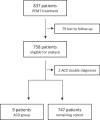Prehospital misdiagnosis of acute cerebral disease for acute coronary syndrome: a retrospective study
- PMID: 36564814
- PMCID: PMC9784279
- DOI: 10.1186/s13049-022-01063-9
Prehospital misdiagnosis of acute cerebral disease for acute coronary syndrome: a retrospective study
Abstract
Objective: In cerebrovascular accidents symptoms, laboratory results and electrocardiogram (ECG) changes can mimic acute coronary syndrome (ACS) and is subsumed as neurogenic stunned myocardium. So far, data regarding the frequency of cerebrovascular accidents misdiagnosed for ACS in a prehospital setting are missing. This study aims to quantify misdiagnoses and discover discriminating features.
Methods: In a retrospective cohort study, prehospital and hospital medical records of all patients treated by physician-staffed emergency medical teams in the city of Bonn (Germany) with suspected ACS in 2018 were evaluated regarding medical history, prehospital symptoms and findings as well as hospital diagnoses.
Results: From 758 patients admitted for presumed ACS, 9 patients (1.2%, 95% CI: 0.5-2.2%) suffered from acute cerebral disease (ACD group). Mainly, diagnoses were cerebrovascular accidents and one case of neuroborreliosis. A history of intracranial haemorrhage was found more often in the ACD group compared to the remaining cohort (OR 19, p = 0.01), while a history of arterial hypertension was less frequent (OR 0.22, p = 0.03). Presentation with headaches (OR 10.1, p = 0.03) or neurological symptoms (OR 16.9, p = 0.01) occurred more frequent in the ACD group. ECG changes were similar between groups.
Conclusion: Acute cerebral disease misdiagnosed for ACS seems more common than assumed. Out of 758 patients with presumed ACS, 9 patients (1.2%) suffered from ACD, which were cerebrovascular accidents mainly. This is highly relevant, since prehospital treatment with heparin and acetylsalicylic acid is indicated in ACS but contraindicated in cerebrovascular accidents without further diagnostics. Thus, discriminating these patients is crucial. An attentive patient history and examination may be the key to differentiating ACD. Due to small ACD group size, further studies are needed.
© 2022. The Author(s).
Conflict of interest statement
The authors declare that they have no competing interests.
References
-
- Roth GA, Abate D, Abate KH, Abay SM, Abbafati C, Abbasi N, et al. Global, regional, and national age-sex-specific mortality for 282 causes of death in 195 countries and territories, 1980–2017: a systematic analysis for the global burden of disease study 2017. The Lancet. 2018;392(10159):1736–1788. doi: 10.1016/S0140-6736(18)32203-7. - DOI - PMC - PubMed
-
- Cushing H. The blood-pressure reaction of acute cerebral compression, illustrated by cases of intracranial hemorrhage: a sequel to the Mütter lecture for 1901. Am J Med Sci. 1903;125(6):1017–1043. doi: 10.1097/00000441-190306000-00006. - DOI
MeSH terms
LinkOut - more resources
Full Text Sources
Medical


